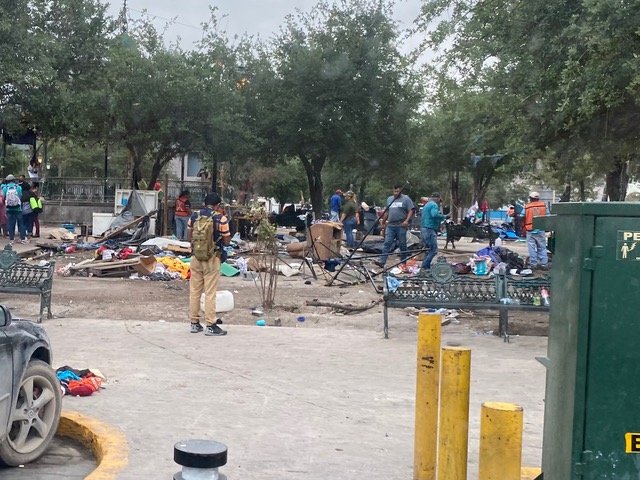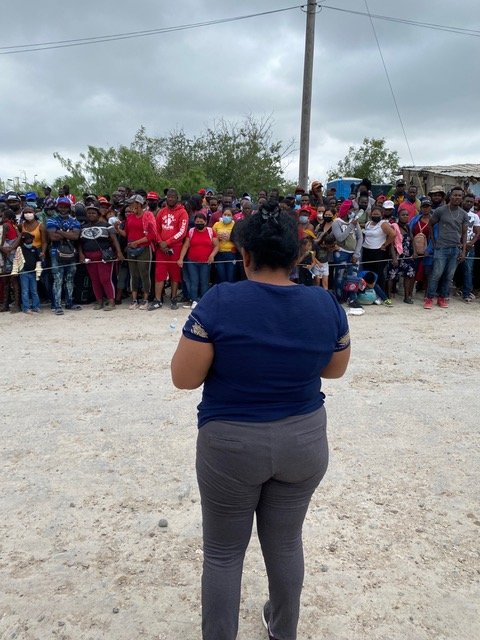What Title 42 Has Wrought

This is the first of a series of blogs about the humanitarian situation at the U.S.-Mexico border. This installment documents the harm and confusion wrought by Title 42. Future installments will focus on what must be done to preserve access to asylum and humanely receive asylum seekers.
More than two years ago, Refugees International wrote about why a policy of expelling asylum seekers at the border under Title 42 of the Public Health Service Act violated the prohibition of non-refoulement and was not justified on public health grounds. Both arguments have been affirmed by federal courts in the District of Columbia and the Centers for Disease Control. And yet, on Friday, May 20, 2022, a judge in Louisiana blocked the Biden administration’s decision to terminate Title 42 the following Monday. In enjoining the administration’s decision, the judge asserted his belief that it would “harm” states like Texas because asylum seekers “will likely require the healthcare and educational services provided by the States at some point” in the future (emphasis added). Remarkably, the judge made no mention of the documented and grave harms that have already befallen so many men, women, and children who have been unable to seek asylum or been expelled under Title 42.
The Louisiana court ruling was not the first time hopes had been dashed and confusion sown about Title 42 at the border. There were many indications last summer that Title 42 was about to end. The varied exceptions to Title 42—whereby some people have not been expelled or have been permitted to enter through ports to pursue asylum in the United States—have waxed and waned with ongoing litigation and negotiations with governments about accepting expelled migrants. This has led to disparities in access to asylum by nationality, by port of entry, and by family composition. It has also caused family separation. When Refugees International visited the border in August 2021, we met a pregnant Honduran woman who had been expelled while her husband and young son had not. When Refugees International visited the border in early May 2022, we met a Honduran father who had never met the year-old son born to his wife after she had been permitted to enter. More than 12,000 children from expelled families have entered the United States on their own in 2021, as Title 42 does not apply to unaccompanied children.

On a recent research trip, Refugees International arrived in Reynosa, Mexico, on May 3—the morning after the Mexican authorities destroyed an encampment of asylum seekers in a plaza near the port of entry. It seemed another instance of what Refugees International has documented elsewhere: an effort by the Mexican authorities to move migrants that leaves them desperate and without support. At an overcrowded local shelter, we spoke to a Salvadoran man who told us that he had been moved out of the plaza with his wife and 8-year-old daughter the night before. The family—who fled targeted violence in El Salvador and were victims of extortion in Reynosa—had tried more than once to seek asylum and been summarily expelled back to Mexico. This of course was in stark violation of U.S. and international refugee law.
In a nearby dangerous section of town, an auxiliary shelter was being built—by unpaid migrants themselves—in a field; the local authorities were eager to take credit for the new shelter, which was not yet habitable and whose construction was mostly being supported by private organizations.

Haitian families were meanwhile living on the streets. Though many had one year humanitarian visas to stay and work in Mexico, few could get jobs. One man told Refugees International of threats by armed men, who demanded that he begin to work for them. A Haitian woman told Refugees International about having been raped, beaten, and robbed in Reynosa when she was trying to find a place for her family to live. We met several Haitians, including children, who had become ill, been kidnapped or attacked, and witnessed brutal violence during their trek through the Darien Gap between Colombia and Panama; they and others were in dire need of medical attention that they could not get in Reynosa. People Refugees International met in Reynosa had stories similar to that of a man who told us: “My wife is pregnant, and my son is sick. We don’t even have a place to sleep. I have nobody to help me here; my family is in the United States.”
On May 5, Refugees International visited Piedras Negras, a city that prides itself for “la frontera mas segura.” Not so for the mostly Honduran men, women, and children we met outside the Casa del Migrante Franciscan shelter close to the port of entry. Because of COVID-19, the city forbade migrants from sleeping at the shelter, although they received food there. Families told us that they sleep in abandoned buildings, garages, or lots. Several people told Refugees International of having been attacked and robbed by local police; one man showed us wounds on his arms from a beating by the police, and another man said that the police cut up his humanitarian visa. There was no work to be had for them in the city, even for those with documents. Several people told us stories of immediate family members who had been killed by gangs in Honduras and of the threats and violence that led them to flee. One woman fled an abusive partner; when she tried to enroll the younger of her two children in school in Piedras Negras, she was told she needed a document signed by her abuser. Among the approximately 25 people with whom we spoke, over half had been waiting in Piedras Negras for a year or more and had close relatives in the United States. Their most common questions were: When is Title 42 going to end? Why are some people able to cross at ports of entry (through exceptions), but not others? And why are some who try to cross the river not expelled but others are, especially Hondurans?
Since returning to Washington, Refugees International has received hundreds of requests for help and information from asylum seekers in both Reynosa and Piedras Negras who wanted to understand what would happen on May 23. It has been difficult to provide them clear answers. And the confusion and expulsions have only continued since. The Louisiana Court’s ruling has kept Title 42 in place. But due to a competing decision from a federal circuit court in the District of Colombia, families manifesting fear of return to their home countries will, as of May 23, have to be screened before being expelled. Although guidance on how to do these screenings went out to U.S. Customs and Border Protection (CBP) on May 23, the very next day the U.S. Department of Homeland Security (DHS) sent four flights carrying 538 people, including 76 children (27 of whom were infants), to Haiti. On May 25, there were three more flights to Haiti. It may be that those being expelled to Haiti have been in custody since before the new screening procedure was put in place. But the flights certainly send an appalling message about DHS disregard of the risks of sending families to harm.
Is it any wonder that people who have been waiting to seek asylum for months are afraid and confused?
On the evening of May 23, a Haitian man wrote Refugees International: “I am in danger, I am looking for refuge, I need more clarity and guidance on what to do.” Because he is a single adult and not a parent accompanied by children, he will not receive a screening under the new guidance—though expelling him to Haiti, where violence is worse than it has been in decades, very likely constitutes refoulement. People at the border face impossible choices and uncertainty as to what will happen to them if they attempt to seek asylum in the United States. A young Haitian man wrote Refugees International on May 24:
I am 24 years old. My mother took me and my younger siblings to Brazil. But she died, and I am in Reynosa looking for help with the little ones. My aunt is in the United States. I do not want to go there because maybe U.S. immigration will separate us or send us to Haiti—and we don’t have anyone else in Haiti!
More Haitians have been expelled by plane than people from any other country. Even as the Biden administration has sent more than 25,000 Haitians, in shackles, to a country in turmoil, it has welcomed and paroled—in two months—about 25,000 Ukrainians into the United States at the U.S.-Mexico border and approved the travel by plane to the United States of another almost 15,000 Ukrainians. While we should welcome support and refuge for Ukrainians in need, it must also be available to those fleeing violence and persecution within our hemisphere and without discrimination.
PHOTO CAPTION: Haitian migrants line up for a COVID-19 test at shelter in Reynosa, Mexico on May 20, 2022. (Photo by Pedro PARDO / AFP) (Photo by PEDRO PARDO/AFP via Getty Images)